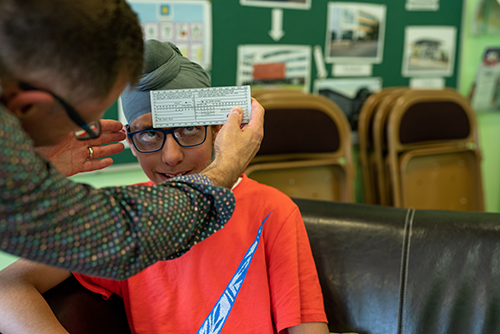SeeAbility
Persuaded the NHS to expand eye care services into special needs schools
Data shows that children with learning disabilities are 28 times more likely to have a serious sight problem and the more profound a child’s learning disability, the more that risk increases. Left untreated this can lead to sight loss and it is estimated that 50% of sight loss in individuals with special needs could have been prevented with treatment.
 SeeAbility set out to demonstrate to NHS England that providing specialist eye care within special schools would benefit children with special needs and ensure they were able to access their right to eye care on the NHS.
SeeAbility set out to demonstrate to NHS England that providing specialist eye care within special schools would benefit children with special needs and ensure they were able to access their right to eye care on the NHS.
From late 2013 to the summer of 2019, the charity carried out a pilot programme offering professional eye care in 11 special schools in England. It conducted more than 3,500 eye tests and dispensed over 1,700 glasses to almost 1,500 children. In addition, it trained almost 800 teaching staff in how children see and use their vision.
Nearly half of the children tested had a problem with their vision, and a third needed glasses. Yet 44% of them had never had their eyes tested (the average age being nearly 11 years old) and the vast majority of the other children were being sent to hospital clinics for their examinations, with parents reporting how anxious this made them.
SeeAbility published its data in a peer-reviewed journal and provided its findings and costings to NHS England. NHS England has now pledged to commission a model of eye care in special needs schools based on the charity’s work, which in the coming years will reach 120,000 children.
The charity is also advising on similar models in Scotland and Northern Ireland.
Charity Awards judge Chris Sherwood said the project “tells a really clear story about unmet healthcare needs”. Judge Martin Edwards said it was a “brilliant example of transforming outcomes for a largely unnoticed group of beneficiaries”.
“They’ve tested it, they based it on evidence and they built on their success with lobbying. They’ve interwoven it with the NHS and 50% of their staff have lived experience.”
He added: “We shouldn’t underestimate how complex it is to get the attention of a multi-layered bureaucracy like the NHS at a national level, and to produce a model that can be rolled out in a devolved health environment.”
CC Reg no. 255913
